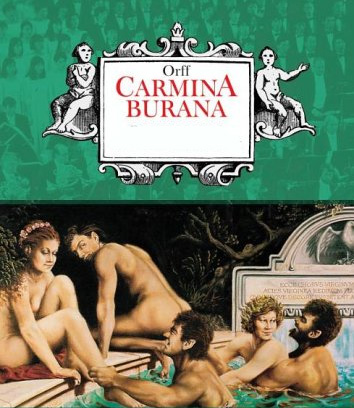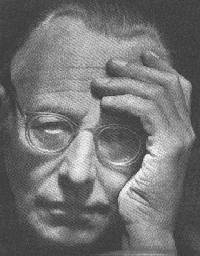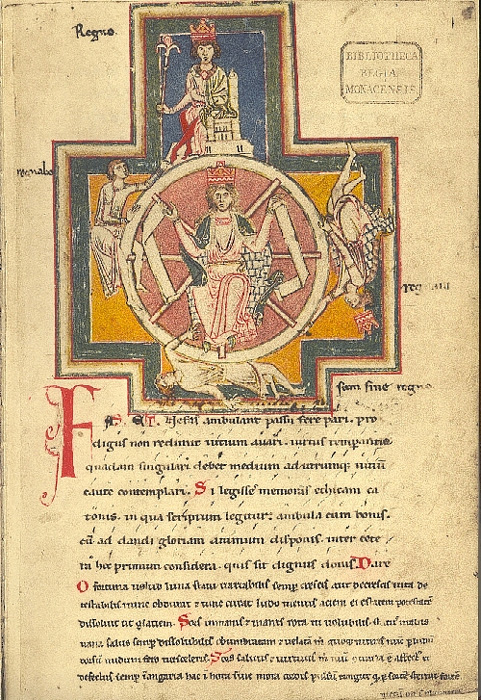Carl Orff
(1895-1982)

|
Carl Orff
(born Munich, 10 July 1895; died there, 29 March 1982).
German composer known particularly for his operas and dramatic
works and for his innovations in music education.
Orff studied at the Munich Academy ofMusic and with the German
composer Heinrich Kaminski and later conductedin Munich,
Mannheim, and Darmstadt. His Schulwerk, a manual describing
hismethod of conducting, was first published in 1930. Orff
edited some 17th-century operas and in 1937 produced his
secular oratorio Carmina Burana . Intended to be staged
with dance, it was based on a manuscript of medieval poems.
Thiswork led to others inspired by Greek theatre and by
medievalmystery plays, notably Catulli carmina (1943; Songs of
Ca tullus) and Trionfo di Afrodite (1953; The Triumph of
Aphrodite), which form a trilogy with Carmina Burana. His
other works include an Easter cantata, Comoedia de Christi Re
surrectione (1956); a nativity play, Ludus de nato infante
mirificus (1960); and a trilogy of “music dramas”—Antigonae
(1949), Oedipus der Tyrann (1959), and Prometheus (1966).
Orff's system of music education for children, largely based
on developing a sense of rhythm through group exercise and
performance with percussion instruments, has been widely
adopted. In 1924 in Munich he founded, with the German gymnast
Dorothee Günther, the Günther School for gymnastics, dance,
and music.
|
Carmina Burana
German Lieder Aus Beuern 13th-century
manuscript that containssongs (the Carmina Burana proper) and
six religious plays. The contents of the manuscript are
attributed to the goliards (q.v.), wandering scholars and
students in western Europe during the 10th to the 13th century
who were known for their songs and poems in praise of revelry.
The collection is also called the Benediktbeuern manuscript,
because it was found (in 1803) at the Benedictine monasteryin
Benediktbeuern (from which burana is derived), Bavaria. The
two parts of the manuscript, though written at the same time,
have been separated. The songs, rhymed lyrics mainly in Latin
with a few in German, vary in subject and style: the reare
drinking songs, serious and licentious love songs, religious
poems, pastoral lyrics, and satires of church and government.
Some of the poems were set to music by Carl Orff in his
cantata Carmina Burana (1937).
The plays, in Latin, include the only known two surviving
complete texts of medieval Passion dramas. These are the Ludus
breviter de Passione (“Play in Brief of the Passion”), a
prologue to a Resurrection play, and a longer text, probably
amplified from a play on St. Mary Magdalene's life and the
raising of Lazarus. The other plays are an Easter play; an
unusually comprehensive Christmas play; an enlarged Peregrinus,
which treats Christ's first two appearances to the disciples;
and Ludus de rege Aegypti (“Play of the King of Egypt”),
formerly regarded as part of the Christmas play.
|
 Carl Orff
Carl Orff
|
Orff
Carl Orff (1895-1982)
 |
Carmina
Burana
1
O Fortuna
2
Fortune plango vulnera (I bemoan the wounds of Fortune)-
Primo vere (in springtime)
3
Veris leta facies (The merry face of spring)
4
Omnia sol temperat (The sun warms everything)
5
Ecce gratum (Behold, the pleasant spring)
Uf dem anger (on the lawn)
6
Tanz
7
Floret silva nobilis (The woods are burgeoning)
8
Chramer, gip die varwe mir (Shopkeeper, give me colour)
9
Reie (Round dance)
10 Were diu
werlt alle min (Were all the world mine)
In Taberna (in the tabern)
11 Estuans
interius (Burning Inside)
12 Cignus
ustus cantat (The Roast Swan)
13 Ego sum
abbas (I am the abbot)
14 In
taberna quando sumus (When we are in the tavern)
Cour d'amours (court of love)
15 Amor
volat undique (Cupid flies everywhere)
16 Dies, nox
et omnia (Day, night and everything)
17 Stetit
puella (A girl stood)
18 Circa mea
pectora (In my heart)
19 Si puer
cum puellula (If a boy with a girl)
20 Veni,
veni, venias (Come, come, O come)
21 In
trutina (In the balance)
22 Tempus
est iocundum (This is the joyful time)
23
Dulcissime (Sweetest one) Blanziflor
et Helena
24 Ave
formosissima (Hail, most beautiful one)
Fortuna Imperatrix Mundi
25 O Fortuna
(reprise)
|
| |
|
|
|
|
|
|
|







No comments:
Post a Comment